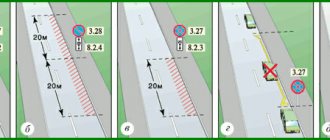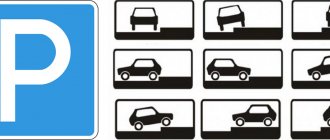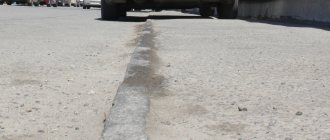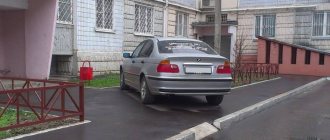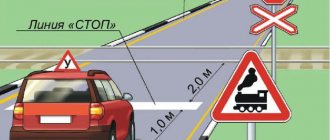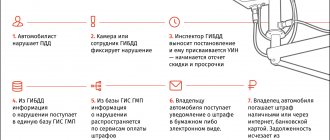Normative base
Parking on the lawn is considered an administrative offense. The amount of the monetary penalty is established in accordance with the norms of the Code of Administrative Offenses of the Russian Federation. In particular, the fine is established in Article 12.19.
Attention! If you have any questions, you can chat for free with a lawyer at the bottom of the screen or call Moscow; Saint Petersburg; Free call for all of Russia.
Regional authorities have the right to adopt their own regulations if they do not contradict the norms of federal laws. The authorities of Moscow and St. Petersburg pay special attention to parking on the lawn. Fines in these cities are higher than in other settlements of the Russian Federation. The amount of penalties is regulated by:
- Law of the city of Moscow on the protection of green spaces of May 5, 1999. The regulation prohibits vehicles from entering or stopping on green areas.
- Article 4.18 of the Moscow City Code on Administrative Offences. Fixes the amount of monetary fines for damage to green spaces.
- Article 8.25 of the Moscow City Code on Administrative Offences. Determines the amount of penalties if a stop is made on the lawn of an area occupied by green spaces.
- Law of St. Petersburg No. 273.70 of May 31, 2010. Determines the amount of penalties for parking in green spaces.
Parking on the lawn is strictly prohibited road sign price
Moscow or St. Petersburg, -
shall entail the imposition of an administrative fine in the amount of two thousand five hundred rubles.”
The minimum distance to the opposite edge of the roadway or continuous marking line.
When parking at a T-shaped intersection, you must also remember that at least 3 m must remain from the side edge of the car to the continuous marking line. The same distance must be maintained to the opposite edge of the roadway or dividing strip.
... in places where the distance between a solid marking line (except indicating the edge of the roadway), a dividing strip or the opposite edge of the roadway and a stopped vehicle is less than 3 m"
Failure to comply with this rule creates obstacles for other vehicles.
sign 3.27 “Stopping is prohibited;
Please note: This sign has stricter restrictions than “No Parking” and prohibits all vehicles other than route vehicles from stopping, even for the shortest time. As for the popular question, is it possible to disembark a passenger under a “no stopping” sign, the answer here is negative, unless you are a driver of a route vehicle and do not disembark passengers at a stop.
sign 3.28 “Parking prohibited”;
Photo of the “no parking” sign:
marking 1.4 “Stopping is prohibited”;
marking 1.10 “Parking prohibited.”
Please note: If additional signs 8.5.5, 8.5.6 or 8.5.7 “Validity hours” are installed on the signs, then parking is prohibited only during those hours or days of the week that are indicated on the sign.
What does it mean for the owner, the driver, not only to pay the fine, but also to the evacuation process itself, storage in the impound lot. It is important to work out this point in advance.
It will be necessary to familiarize yourself with the traffic rules, as well as understand how the two terms below differ from each other:
This is especially important, since the traffic rules reflect many different nuances associated with such terms. This issue will need to be sorted out in advance. Moreover, this issue is considered in sufficient detail.
In simple terms, the main difference is precisely the length of time the vehicle is left in a specific place.
The stop is a short maneuver.
When is the fine for parking on the lawn in 2021?
In 2021, a fine will be imposed if the driver leaves the vehicle on the lawn. The term is not specified in any federal legislative act. The only mention is in the traffic rules. The term is indicated together with the concept of Sidewalk. However, there is also no interpretation. When imposing a fine for parking on a lawn, representatives of the state traffic inspectorate rely on their own ideas about the word or a definition from a dictionary. Typically, the concept of lawn is understood as a well-groomed piece of land on which there is short-trimmed grass, ornamental or perennial plants. If a person stops at such a place, he will be held accountable.
It is recommended to rely on the legislation of the constituent entity of the Russian Federation. Thus, a clear definition of a lawn is given in the note to Article 32 of the Law of St. Petersburg No. 273-70. The concept refers to the surface of the Earth that does not have a hard covering with side stones or other material, and is also covered with vegetation of natural or artificial origin. The lawn is used for landscaping the area.
Local regulations do not always prohibit damage to land. In this situation, the penalty is issued simply for illegal parking.
Penalties for parking and parking on the lawn in 2021
For violations committed, the person will be held administratively liable. The amount of the penalty is determined by Article 12.19 of the Code of Administrative Offenses of the Russian Federation and regional regulations. The amount may vary depending on the region. In St. Petersburg and Moscow, the amount of the penalty is much larger than in other localities.
Regional legislation may contain its own enforcement measures if they do not contradict the provisions of federal regulations. Thus, in accordance with Article 8.25 of the administrative code of the city of Moscow, violators may be required to restore green spaces that were damaged as a result of the actions of the car owner. The measure is applied in addition to the fine.
“No Parking” sign: the effect of the sign, parking under the sign and the fine for it
It has a round shape and is approximately 0.25 m in diameter.
So, for example, in the code published in 2014, for ignoring the requirement “Parking is prohibited” (sign), the fine is 1,500 rubles in any locality, and in Moscow and St. Petersburg it increases to 3,000 rubles.
By the way, depending on the situation, it is also possible to detain the vehicle. Therefore, to avoid this, you need to clearly understand how and in what territory this sign is valid, and take into account all the subtleties prescribed in the traffic rules on the road.
How to avoid a fine for incorrect parking - rules for stopping and parking and methods for parking cars
On wider bridges with more than two passing lanes, stopping is permitted, as it does not interfere with traffic.
Tunnels and places located under bridges and overpasses.
Which is related to minimizing the consequences of road accidents associated with vehicles falling from bridges and overpasses.
If there is a specially equipped area under the overpass with a parking sign installed, then parking in this place is permitted. Not wide roads, where the gap between a stationary car and the edge of the road or its continuous line remains less than 3 meters. In this case, it becomes difficult to bypass standing vehicles or this will require crossing the dividing line, which is prohibited by the Rules.
Distances closer than 5 m to the edge of the pedestrian crossing and the marked pedestrian crossing area.
Fines for parking on grass in 2021
The application of fines is drawn up in accordance with the norms of Article 12.19 of the Code of Administrative Offenses of the Russian Federation and regional legislative acts. The fine for parking on a lawn in 2021 varies from 500 to 5,000 rubles (the amount depends on the location of the offense). The concept of Lawn does not appear in the legal act. However, monetary penalties for violating parking or stopping rules are reflected here. The rules apply to persons who leave a vehicle on the lawn.
For residents of regions of the Russian Federation, a penalty of 500 rubles is provided in accordance with Article 12.19, paragraph 1 of the Code of Administrative Offenses of the Russian Federation. The authorized body may limit itself to a warning. More severe penalties are applied to residents of federal cities (Moscow; St. Petersburg). Penalties reach up to 5,000 rubles (Article 8.25 of the Moscow Administrative Code).
If a resident of the capital damages green spaces, Article 4.18 of the Moscow City Code on Administrative Offenses comes into force. The amount of the penalty for citizens increases to 4,000-4,500 rubles. If the violation was committed by an official, you will have to pay 50,000 rubles. A fine of up to RUB 300,000 may be applied to legal entities.
If a car is placed in Moscow on a lawn, near a children's playground, in accordance with Article 8.8 Part 3 of the Moscow Code, the fine will be:
- for citizens – 5000 rubles;
- for officials – 30,000 rubles;
- for legal entities – 300,000 rubles.
If the car is placed on a lawn or other territory in the city of Moscow occupied by green spaces, the punishment is established by Article 8.25 of the administrative code of the city of Moscow. The amount of penalties is as follows:
- for citizens – 3000-5000 rubles;
- for officials – 15,000-20,000 rubles;
- for legal entities – 100,000-200,000 rubles.
If the violation is committed in St. Petersburg, the fine is imposed in accordance with Law No. 273 -70, Article 32. The punishment will be as follows:
- for citizens – 3000-5000 rubles;
- for officials – 5,000-40,000 rubles;
- for legal entities – 150,000-500,000 rubles.
Amount of fines in federal cities and regions
The laws of each region establish different fines for unauthorized parking on the lawn.
| City name | Current fine amounts in rubles | ||
| for an individual | for officials | for a legal entity | |
| Moscow | 4000-4500 | 30000 | 300000 |
| Saint Petersburg | 3000 — 5000 | 5000-40000 | 150000-500000 |
| Ryazan | 500-2000 | 1000-5000 | 5000-20000 |
| N.Novgorod | 2000-4000 | 5000-10000 | 30000-60000 |
The largest amounts are established by the laws of federal cities. In Moscow, a citizen will be charged 5,000 rubles for parking on a lawn. If the vehicle is registered to a legal entity, the fine can reach 300 thousand rubles.
The legislation of the Northern capital determines the minimum fine to be 3,000 rubles. – for citizens, 5000 rubles. – for officials, and 150,000 – for legal entities.
In regional centers far from the capital, sanctions are smaller and can vary from 500 to 60,000 rubles. For example, according to the Law of the Ryazan Region dated December 4, 2008, it is determined that individuals. a person must pay 500 rubles for entering the lawn part for the first time and up to 2000 rubles for a repeated violation (clause 3.5). The 2003 Law of the Nizhny Novgorod Region in Article 3.10 determines that the minimum fine of 2,000 rubles is established for citizens, and the maximum fine for legal entities is 60,000 rubles.
The amount of the payment will depend on the time the offender is caught for committing this action. If the vehicle is left in such territory for the first time, the punishment will be minimal. For malicious repeated violation of city rules, the driver can pay tens of times more.
Who is allowed to park on the lawn in 2021?
The legislation does not contain a clear list of situations in which parking on the lawn is permissible in 2021. You can defend your rights and avoid monetary penalties in the following situations:
- The site does not fall under the definition of a lawn and is not recognized by it from a legal point of view. A traffic police representative cannot impose a fine on a citizen for parking on a lawn. However, residents of the house have the right to initiate legal proceedings and recognize the local area as a lawn.
- There is a permit provided by the traffic police. The document is issued extremely rarely. However, his presence frees the citizen from monetary penalties. Based on the paper, it will be possible to challenge the fine if it was issued.
- There is no harm to green spaces. By 2021, a modern eco-lawn has already been developed. It is resistant to damage caused by car wheels. However, such sites are still present only in large populated areas.
- Parking sign installed. It lifts the ban on leaving a car on the lawn.
- The shutdown was carried out in winter. Under a layer of snow, it is difficult to understand whether there is a lawn or whether there is open ground under the wheels of a car. However, the legislation does not provide direct permission to enter the lawn during the cold season. The only exceptions are the regulations of several cities of the Russian Federation.
In all other cases, parking on the lawn is considered illegal. An employee of the State Traffic Inspectorate has the right to draw up a protocol, hold the driver accountable and issue a fine for parking on the lawn.
A person may be called to a commission. The local administration is looking into the situation. If a citizen argues for an action, instead of a fine for parking on the lawn, a reprimand may be applied. If a person does not appear at the meeting, challenging the commission’s decision will be problematic.
Exceptions
A motorist can appeal the decision to penalize him for improper parking. Drivers who parked are not held liable:
- on a green area covered with soil resistant to external influences;
- on the territory under the “Parking” sign, allowing long-term parking of vehicles;
- with the permission of a traffic police officer (for example, if he himself stops the driver);
- in exceptional cases (severe pain, feeling unwell, helping someone, etc.).
Even if parking on the lawn was caused by extreme necessity, but a protocol has already been drawn up against the driver and an order has been issued, they can be challenged in a court of general jurisdiction.
The period for appealing in such cases is no more than 10 days from the moment the owner of the car receives documents on bringing to responsibility. If for good reasons this period is missed (such reasons include being in the hospital, failure to receive correspondence due to a business trip, etc.), the appeal period can be restored by the court at the request of the car owner.
In order not to violate parking rules and not drive onto lawns, the driver can plan his route in advance and think about where and for how long he will leave the car. For such planning, you can turn to electronic services that offer access to maps of the required area (Yandex.Maps, websites of city administrations).
Camera fine for parking on the lawn
In a classic situation, a violation of the rules is recorded by a traffic police inspector. He hands the driver a fine. This is a standard sheet on which the number is indicated and there is a link to the legal act that was violated. Additionally, information about the car, the amount of the monetary penalty and the date of the incident are recorded.
In the capital, control over compliance with parking rules is carried out by inspectors from MADI and the State Institution of the Autonomous Republic of Belarus. Pedestrians in nearby yards report illegal parking.
If the inspector is not nearby, the violation may be recorded by surveillance cameras. They are installed in crowded places. The video is being processed by representatives of the State Traffic Inspectorate. Within 3 days, the person will be sent a letter with a fine for parking on the lawn. Additionally, photo evidence of guilt is attached. The photo must clearly show the license plates of the vehicle and the fact of hitting the lawn.
If a person does not agree with the imposed punishment, an appeal is permissible. If the violation is recorded by cameras, you need to contact the institution that imposed the punishment.
Parking on the lawn: who fines and how
The law does not contain the concept of “lawn”, and in the traffic rules it is mentioned only when describing the sidewalk (Article 1 of the traffic rules), as an element separating the pedestrian zone and the roadway. When drawing up a protocol, a traffic police inspector or local authorities use the definition of a lawn from an explanatory dictionary, for example, Tatyana Efremova defines a lawn as “a plot of land with short-cut grass.” Sometimes traffic police officers write in the protocol that the driver parked on the lawn, without describing the concept of such green space.
In some regions, the concept of “lawn” is enshrined in local laws. For example, in the Moscow region it is understood as an artificially created area with grass and the possibility of placing green spaces and park structures on it (Article 4 of the Law of the Moscow Region No. 191/2014-OZ “On Landscaping”). And the authorities in Tver defined such a surface as a grass cover created by sowing seeds of specially selected grasses, as well as natural grass vegetation (clause 1.5 of the Appendix to the Decision of the Tver City Duma No. 368 of October 16, 2014).
But the absence of an exact term in federal laws does not mean that the punishment for parking on the lawn is illegal, so you should be extremely careful and park only on asphalt.
Have you asked? We answer*
Leading lawyer of the European Legal Service Orest Matsala answers that the fines are legal, since in one case traffic rules (parking rules) were violated, for which punishment is provided under the federal Code of Administrative Offenses. And in another case - regional legislation on the protection of green spaces or landscaping rules, the fine for violation of which is established by local regulations.
What is the penalty for parking on the lawn?
Regional authorities independently set the amount of fines for parking on the lawn. If it is not provided for, then the driver will have to pay 500 rubles under Art. 12.19 Code of Administrative Offenses (“Violation of the rules of stopping and parking vehicles”). At the same time, parking on the lawn with one wheel or in winter, if plantings are visible through the snow, is also a violation. As a rule, if a driver parks like this for the first time, he will receive a minimum penalty. If you violate it again, you will have to pay the maximum.
Who records violations for parking on the lawn?
Inspectors of the traffic police, MADI (in Moscow), cameras, local governments and ordinary citizens (through the applications “Moscow Assistant”, “People’s Inspector”, etc.) can take a photo of the violator. Then these materials and the statement of offense are handed over to the police or local administrations, since only they have the right to issue a fine to the motorist.
Life hack for Muscovites: canceling fines for parking on the lawn
In order not to be mistaken whether the area on which the car is parked belongs to the lawn, in Moscow and some regions a diagram has been developed on which such green spaces are marked. That is why there are practically no complaints about fines for parking on the lawn in Moscow, because the legality of local norms was confirmed by the Constitutional Court (Determination No. 2790-O of November 8, 2018).
Have you asked? We answer*
Leading lawyer of the European Legal Service Orest Matsala says that it is necessary to record illegal parking on the lawn in a photo or video and send it along with a statement of prosecution to the local administration and police. The car will not be placed in the impound lot, but the expert explains: “The car can be taken away as material evidence during the trial, but this is used extremely rarely.”
Within 3 days from the moment the fine is issued, it will be sent to the violator, who must check that the license plates are clearly visible on the car and that it has hit the lawn. At the same time, it is important to know that if the car was parked on the lawn for several days, and the driver received several fines for each day of inactivity, then he is obliged to pay only one: the rest are cancelled.
The 50% discount does not apply to fines for parking on the lawn.
When you won't be fined for parking on the lawn
- The car is parked on an eco-parking lot - a metal grate that protects the lawn from damage by car wheels;
- If the parking area is not a green area, a lawn according to a scheme approved by the municipality;
- A sign permitting parking has been installed at the parking area;
- Violations were committed when assigning a fine to the driver for parking on the lawn.
Thus, a motorist from Moscow parked her car in the courtyard of a high-rise building, but received a fine of 5,000 rubles. for parking on the lawn under Art. 8.25 of the Code of Administrative Offenses of Moscow (“Placing cars on green spaces”). Disagreeing with the decision, she filed a complaint with the Moscow City Court. Judge Lyudmila Sumina requested information from the AIS “Register of Green Spaces”, from which it was clear that the area where the driver left her car was a courtyard and there was no lawn on it. The Moscow City Court canceled the fine to the car owner, since there was no corpus delicti of an administrative offense (case No. 7-0013/2018).
In Kursk, a resident of an apartment building complained to the local administration that Vladimir Korneev** constantly parks his car on the lawn. Local authorities recorded a violation and fined the motorist 3,000 rubles. He filed a complaint with the Leninsky District Court of Kursk and claimed that the car in the photo did not belong to him. Judge Elena Skripkina did not find any evidence in the case file that the area where the car was parked was a lawn. There was no protocol for examining the scene of the incident, and from the photographs of the car it is not clear when, where, by whom and under what circumstances they were taken, so Korneev’s fine was canceled (case No. 12-963/2018).
The administrative commission of the city of Cheboksary fined the driver 1,000 rubles. for parking on the lawn. Considering such a sanction illegal, he filed a complaint with the Moskovsky District Court of the city of Cheboksary. The motorist argued that, with the help and resources of the residents of the high-rise building, an eco-parking lot was built on the territory where he left his car, where he could leave his car. After studying the contract for the supply of construction materials, the estimate for the installation of an open parking lot and photographs of the car, judge Aleksey Nikitin found that the car was parked in a specially designated place, so he canceled the fine for the driver (case No. 12-1217/2015).
Have you asked? We answer*
Leading lawyer of the European Legal Service Orest Matsala explains that, as a rule, courts do not cancel fines for parking on a lawn that was not visible due to snow. But its owner is obliged to notify residents that there is a lawn in the fenced area. If the driver did not know and could not know that he was driving onto a lawn, then he should not be punished, the expert adds: “After all, due to the snow and the lack of a fence, the parker cannot determine whether he is causing damage or not.”
*Questions found on automotive forums and websites.
**The names of the participants in the dispute have been changed by the editors
- Marina Kensheva
Fine for parking on the lawn in the yard
Parking a vehicle on a lawn causes damage to the grass surface. As a result, the appearance of the landscape deteriorates. Grass stuck to car wheels pollutes asphalt areas. Sometimes lumps of dirt are carried along with it, which fall off in layers onto the asphalt. They are compacted by passing cars.
Parking on lawns in courtyards is prohibited in 2021. Standard penalties are applied to the violator. The citizen will be fined. Its size varies from 500 to 5000 rubles. depending on the region. Sometimes the person is additionally required to restore the damaged lawn.
Representatives of authorized bodies monitor compliance with the rules in the yards. There may be no cameras here. Inspectors visit the local area less frequently than central streets. However, the residents themselves can take action against the offender. If such a stop causes outrage and dissatisfaction, you can file a complaint. In 2021, the following may be considered:
- district engineering service;
- management companies;
- a special commission monitoring changes in penalties for illegal parking;
- representatives of district police departments.
Institutions may vary by region. First of all, it is recommended to contact the car owner and ask if there is a solution for stopping on the lawn. If a person refuses to perform an action, filing a complaint is permissible.
GATI for your cars
The State Administrative and Technical Inspectorate (GATI) proposes to make changes to the St. Petersburg Law “On Administrative Violations”. In particular, we are talking about supplementing Article 32, which provides for administrative liability for placing vehicles on lawns. Today, parking cars in green areas entails a fine for citizens in the amount of three to five thousand rubles; for officials - from five to 40 thousand rubles; for legal entities - from 150 to 500 thousand rubles.
It must be said that the initiators of the amendments do not propose to increase the fine. And they propose to increase the number of inspectors, that is, to allow the collection of fines by GATI employees.
This right is vested only in district administrations and housing inspectors, for whom the problem of parking, of course, is not a primary concern. GATI has a control department and, according to the initiators of the amendments, will be able to provide a clearer system for collecting fines. It is expected that it will look like this: GATI inspectors will conduct raids on the courtyards and streets of the city, identifying violators. If any are found, they will draw up an inspection report with photographic recording. Then make a determination to request the car owner’s data from the traffic police. After receiving the data, a fine will be imposed on the owner.
Today, experts note, two circumstances cause great difficulty in punishing illegal parking. First: the law does not clearly define what constitutes a lawn. It turns out that not every piece of land with grass and flowers can be officially listed as such and become the reason for a fine for the car owner who parked his car on it.
And secondly, in order for these amendments to work in full force, car owners must have a legitimate alternative. There are not enough places for proper parking in the city.
According to the chairman of the All-Russian Society of Motorists, Valery Soldunov, the city is provided with parking spaces by no more than 40 percent. There is a particularly shortage of parking spaces in new buildings and residential areas. According to development standards, today there should be one parking space per 80 square meters of housing in the city. That is, approximately one car for two apartments. In reality, the situation is different: it happens that one family has two or even three cars.
— The estimated number of cars in St. Petersburg today should be 420 cars per 1000 people. In fact, there are about a hundred more cars,” says Valery Soldunov. — Perhaps the disproportion is even more striking, since no one counts guest cars - that is, those motorists who come to St. Petersburg on their wheels for several days: after all, they also have to park somewhere.
Experts clarify: according to the standards, each newly introduced residential complex must be provided with above-ground or underground parking, but the cost of a parking space there is comparable to the cost of an apartment.
Therefore, not every city resident who buys a home with a mortgage is ready to pay a substantial amount for a place for their car.
Valery Soldunov does not deny: violators of the law must be punished.
— It is clear that replenishing the budget by increasing the frequency of fines is a path that is popular with the authorities today. But the question arises: how much will it cost the city to maintain a new staff of inspectors? Are there provisions for establishing legitimate parking spaces where incorrectly parked car owners should be redirected? In my opinion, this problem, which is undoubtedly extremely acute for St. Petersburg, must be solved comprehensively, taking into account all prospects.
Fines for parking on the lawn in winter
In winter, it is more difficult to figure out where the lawn ends. In most regions of the Russian Federation there is no grass. However, this does not always give the right to stop on the lawn. It all depends on the current legislation. If the regional administrative code provides for monetary penalties, the rule will apply in winter, regardless of whether the area is covered with snow or not. The size of the fine remains exactly the same as in the summer period from 500 to 5000 rubles depending on the region. However, if local regulations reflect a list of exceptions that imply the possibility of stopping on the lawn in winter, they will not be able to impose penalties for illegal parking.
Does the time of year affect the violation?
Due to the fact that the presence of green areas cannot be observed in every season, a logical question arises: is it possible to be held liable for parking on the lawn in winter?
According to the position of the legislator, set out in the Administrative Code, the ban on parking on the lawn does not depend on the time of year. That is, it is possible to formally hold people accountable for parking on an area allocated for a lawn even in winter. This allows you to protect an area of soil that may be subject to serious deformation when vehicles drive onto it, even in winter.
On the other hand, fines for driving on the lawn in winter have been successfully challenged by drivers many times, since in winter it is impossible to establish clear boundaries of such zones.
Fine for parking on a lawn in Moscow
Article 12.19 of the Code of Administrative Offenses of the Russian Federation establishes only the general amount of penalties that can be imposed on a violator for illegal parking. However, there are no provisions regarding stopping on the lawn. Moscow has adopted its own city code of administrative offenses. Here, Article 8.25 reflects penalties for citizens, officials and legal entities:
- Regular drivers are required to pay 5,000 rubles.
- For officials, the amount of the penalty is 30,000 rubles.
- If the violation was committed by an organization, it will be charged 300,000 rubles.
Fine for parking on a lawn in St. Petersburg
St. Petersburg has also adopted its own legal act. This is law number 273-70 of May 31, 2010. Penalties for parking and parking on the lawn are fixed here. The amount of the fine is reflected in Article 32. Ordinary citizens who commit a violation must pay 3,000-5,000 rubles. For officials, the figure increases and amounts to 5,000-40,000 rubles. If the violation was committed by a legal organization, the amount of the penalty reaches 150,000-500,000 rubles.
Exceptions apply. If damage to green spaces was caused by a vehicle involved in maintenance work, planting or repairs, no penalty will be imposed.
Mobile app
In the summer of 2015, a new mobile software “Moscow Assistant” appeared, which worked in pilot mode. With the help of this application, parking on the lawn is formed in the form of a photo complaint. Restriction: currently available only in the area of the Third Transport Ring. By downloading the program to a mobile device from Google Play or the AppStore, any Muscovite can record any violations of parking and stopping, as well as parking on the lawn. The application's functions are constantly expanding. Only registered users of the State Services portal have access to downloading. The information is entered into the MADI database, and inspectors check and record violations, and then issue a fine.
Towing a car for parking on the lawn
The process of evacuation of a vehicle is regulated by Article 27.13 of the Code of Administrative Offenses of the Russian Federation. It says that the car can be seized for non-compliance with the requirements prescribed by road signs prohibiting stopping or parking of vehicles. When it comes to parking on lawns, the car does not interfere with the movement of other vehicles. The corresponding signs are also usually missing. Therefore, forced evacuation of a car for parking on the lawn is unacceptable. This kind of action is considered illegal.
When faced with something like this, you need to defend your rights. It is recommended to do the following:
- Find out who gave the illegal order to place the car in the impound lot.
- Prepare a complaint. It is sent to the prosecutor's office or court.
- Challenge the requirement to pay the costs of towing the car and storing it in the impound lot.
Which institution regulates violations?
Based on the foregoing, it is obvious that parking of cars on vegetation/lawn is regulated primarily by law enforcement agencies represented by the local police officer or highly specialized traffic authorities. In this case, it is possible to involve judicial institutions or supervisory authorities in the work.
Who fines for parking cars on the lawn (makes a decision on imposing fines on persons who park illegally):
- district commissioner within the territory he serves;
- traffic police inspector;
- an ordinary police officer temporarily vested with appropriate powers.
As for the desire to complain to the court, this action is carried out either by a direct law enforcement agency or by the violator to appeal the charges against him. Also, to conduct inspections of institutions and the activities of their officials, a person can complain directly to the prosecutor’s office: territorial, and then general, canceling the decisions of previous authorities.
Alternative options for addressing the problem of cars on the lawn are public organizations that can actively conduct their main activities in the Internet space. Such services are often welcomed by government agencies. For example, the same traffic police sends a user to record traffic violations using the SafeRoads.rf portal.
This portal is designed to transmit reports of violations (including parking on lawns) in the field of traffic and the quality of road surfaces. Violations about parking on the lawn are not entirely appropriate here. However, even in this case the problem can be solved indirectly. For example, if you have to park on the lawn due to problems with the asphalt surface in the immediate parking area.
It is worth noting that the service, which is suitable for expressing opinions about offenses, was developed for citizens of Moscow. Its name is Moscow Helper. Here you can complain about cars on the lawn by attaching a photo of the identified episode directly from your smartphone. In this case, the photograph must comply with the standards. So the car should be well lit, the angle should display the make and color, as well as the individual number of the car.
Download Moscow Helper applications
Payment
A monetary penalty is imposed by the traffic police, MADI or other authorized bodies. Periodically, raids are carried out in courtyard areas to identify violators. The driver learns about the monetary penalty after it has been applied.
A fine for parking on a lawn in 2021 can be challenged. However, proving innocence is problematic. If a citizen admits his guilt, it is recommended to carry out the procedure for paying a fine for parking on a lawn as quickly as possible. For the convenience of citizens, several payment methods have been developed:
- while visiting a bank that accepts payment of fines;
- using ATMs or terminals;
- through the bank’s online system;
- using electronic wallets;
- by contacting the traffic police.
It is acceptable to use the State Services portal. The system makes it possible to make payments with minimal time expenditure. However, the option is available only to registered users. When a person has acquired an account in the public service system, he will be able to receive notifications about fines and tax debts. The process of depositing funds through the portal is carried out according to the following scheme:
- The citizen completes the authorization procedure, then clicks on the traffic police fines section.
- The presence of monetary penalties is checked. If they are available, you need to click on the pay button.
- Then you have to choose a payment method. Closing of obligations is carried out using the non-cash method. No commission is charged. Money arrives almost instantly.
- If required, printing a receipt is acceptable.
Discount on fines for parking on the lawn
Federal Law No. 437 of December 22, 2014 On amendments to the Code of Administrative Offenses of the Russian Federation in Article 32.2, paragraph 1.3, established the ability to pay fines with a 50% discount. The discount on paying fines for parking on the lawn in 2021 also applies. Payment must be made 20 days from the date of the decision. The date is recorded in the upper left corner of the document. It is not recommended to wait until the last few days. Transferring funds usually takes several days.
If the payment was made within 21 days, the fine for parking on the lawn will have to be paid in full.
What should I do if I received a fine for parking on the lawn by mistake?
In practice, a fine for parking on a lawn may be issued erroneously. If a person is sure that he did not violate, and monetary penalties are listed in the database, in 2021 the following actions must be taken:
- Familiarize yourself with the features of the protocol. If it is not true, you can safely move on to the next step. When a fine is issued using a camera, the protocol is always supplemented with a photograph. If it shows a photo of another car, then in this case it will be much easier to prove that the citizen did not violate the rules.
- Contact the traffic police. Here you can find out the origin of the fine. Often the error occurs due to incorrect data entry into the database. If this fact becomes clear, the penalty may be lifted within a few days. Data about him will simply be removed from the database.
- If representatives of the authorized body refuse to carry out the procedure and do not want to admit that the imposition of punishment was erroneous, it is recommended to begin the appeal procedure.
Appealing a fine for parking on the lawn
If a fine is imposed for parking on a lawn, the motorist can pay the fine or appeal the decision. The procedure must be initiated within 10 days from the date of receipt of a copy of the resolution. The rule is enshrined in Article 30.3 of the Code of Administrative Offenses of the Russian Federation. It is recommended to proceed according to the following scheme:
- Draw up a complaint and send it to the authorized body. You need to contact the organization that issued the protocol.
- Wait for the application to be reviewed. In accordance with Federal Law No. 59 of May 2, 2006 On the procedure for considering appeals from citizens of the Russian Federation, a response must be given within 30 days. If the situation is complex, the period can be extended to 2 months.
- Go to court if the answer was not given within the established period, or the decision made does not suit the citizen.
Often the termination of a case is carried out on formal grounds. Often, representatives of the state administration violate procedural law and also do not comply with the statute of limitations. In accordance with Article 4.5 of the Code of Administrative Offenses of the Russian Federation, a person can be held accountable if no more than 3 months have passed since the date of the violation.
Applications to appeal a fine for parking on the lawn can be found here.
What are the deadlines for appealing a MADI decision?
The period for appealing a fine imposed on a legal entity is 10 days from the date of receipt of the decision. Please note that the deadline does NOT start from the date when the violation itself occurred (the driver parked the car on the lawn), but namely from the date when the legal entity. the person received a ruling. Decrees come from MADI by registered mail with tracking numbers; accordingly, the date of receipt of the resolution will be visible on the Russian Post website and this information can be verified very simply. A little more about the countdown of the deadline for appealing the MADI decision under Art. 8.25 Code of Administrative Offenses:
- upon receipt at the post office, 10 days are counted from the day you received the letter
- when applying in person to MADI, the period is counted from the date of personal delivery
- if the storage period for the letter at the post office has expired and it has gone back to MADI, then 10 days are calculated from the last day the letter was stored at the post office
If you find a fine for parking on the lawn in an application, on a website, etc., then we strongly do not recommend waiting for the decision by mail. Letters in the mail sometimes get lost, simply disappear without a trace, are handed to the wrong people, MADI makes a mistake in the recipient's address and a million other reasons. Explaining later in court that the letter was lost somewhere in the mail and the deadline was missed for a good reason is not the most pleasant experience and does not always end in success. Don’t risk 300,000 rubles - you urgently need to go to MADI and get a resolution on purpose!
MADI address: Moscow, st. Kalanchevskaya, 49 (metro station Komsomolskaya, 10 min walk)
If this deadline is missed, then this is of course not good and complicates the procedure, but is not an insurmountable obstacle. The period for appeal is restored in court simultaneously with the consideration of the case on the merits; in practice, Moscow courts do not interfere with the restoration of the period.
Loshakov Sergey
Leading lawyer of the bar
Sergey Valerievich is an active lawyer of the Moscow Bar Association with extensive judicial practice and extensive experience. Fill out the application in the feedback form and receive a free initial consultation with a specialist.
Nuances
Employees of the authorized body must also prove that an offense was committed. Fines are imposed in the following situations:
- The person was caught at the scene of the crime.
- There are photos and videos confirming the fact of stopping on the lawn.
- There are numerous testimonies that become the reason for contacting the authorized body.
Traffic police representatives have the right to seize surveillance records from nearby buildings. The action is applied if there are suspicions of illegal actions being committed, but there is little evidence. If the representative of the authorized body does not have enough arguments, you can try to challenge the fine. If a monetary penalty has already been imposed, the motorist will have to prove his innocence.


